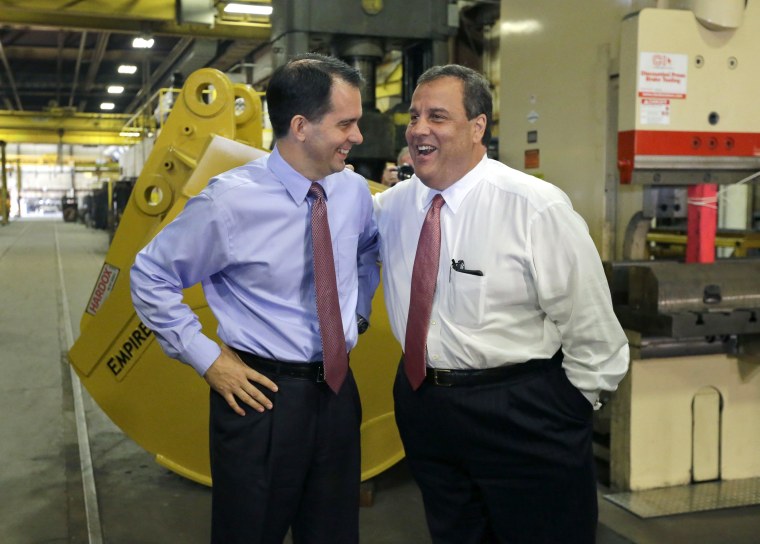Two governors with presidential aspirations and two very different approaches to labor unions will be on display at one conservative conference this week, making for a very interesting stylistic and ideological mix.
Wisconsin Governor Scott Walker and New Jersey Governor Chris Christie spoke at the annual activist-filled Conservative Political Action Conference (CPAC) just hours apart and union-related battles going on in their respective states played a role in their speeches and reception at CPAC.
In Wisconsin, Walker has indicated that he would support an anti-union "right to work" law in his state that would further erode the role of unions there. He bragged about his combative approach to unions at CPAC Thursday afternoon to wild applause, noting that Wisconsin will be the 25th "right to work" state as early as next week.
Meanwhile, 900 miles away in New Jersey, where Christie announced a deal with a major teacher union in the state over their pension program earlier this week, he highlighted his ability to "bring people together."
"The teachers unions and I have not had the warmest relationship," Christie said, adding that he "went after them." But then he said that his tough-tactics brought progress.
"When you are tough like that, that's when you finally get in the position to be able to negotiate and bring people together," Christie said.
Christie’s preliminary deal with teachers could lend him some credibility on the campaign trail as someone who is able to work with opponents to solve problems. But inside the conservative movement that approach might not be as appealing. Conservatives tend to favor more aggressive postures against unions and it will be a topic of conversation at CPAC. Between the two speeches is an anti-union forum titled “There’s No ‘I’ in Teamsters.”
Walker made a national name for himself in 2011 when he battled with public sector unions, diminishing their role. A conservative activists and syndicated talk show host based in Iowa, Steve Deace, said in a recent interview that "he's the only Republican who has a trophy … he dismantled a Democratic pillar."
Now Walker is taking that effort one step further by committing to support a bill born in the state legislature that would prohibit employees in union shops from being required to join or pay union dues. The measure narrowly passed the Republican-led Senate Wednesday evening and the measure now heads to the Republican-led Assembly.
“I think Governor Walker has stood up and stood on principle on these issues,” Mark Mix, president of the National Right to Work Committee, said. “He hasn’t really wavered.”
Christie’s preliminary agreement with the teachers union might not be looked on as positively. While he has had a confrontational relationship with the unions during his tenure, once saying “unions are the problem” with the schools, he has taken the opposite approach of Walker. While Walker was gutting the public sector unions in 2011, Christie signed a bill passed by the Democratic-led state legislature that would increase pension payments.
“He talks more about it than he actually does it,” Mix said of Christie’s tough talk against unions. “He has the perception of a tough guy,” and cautioned that Christie’s work with the unions get him many conservative supporters outside of New Jersey.
Christie is faced with a different political environment than Walker, however. Union participation in New Jersey is 16% compared to 12% of the workforce in Wisconsin, and Walker is paired with a Republican state legislature while New Jersey is led by Democrats. But the overarching headlines continue to play into the themes that Walker is a committed conservative while Christie just talks about being one.
